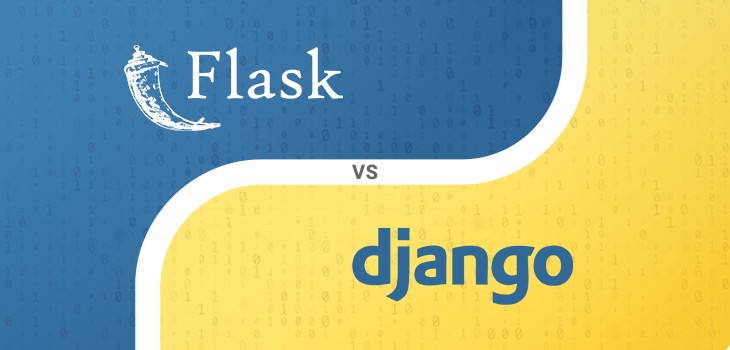
According to JetBrains Python Developers Survey in 2018, Flask and Django are by far the two most widely-used Python frameworks.
Alongside these, .NET development remains a significant force in the industry, especially for applications requiring robust, scalable, and secure frameworks.
It is not surprising that Flask overtook Django to take the top position, considering that the industry of web development has been moving towards microservices, smaller frameworks, and platforms that are “serverless” over the last five years approximately.
The .NET framework, with its extensive set of libraries and support for multiple programming languages, continues to be a preferred choice for enterprise-level applications, highlighting the diversity of options available to developers for web development projects.
Django and Flask are extensible, mature web frameworks that, at their heart, provide similar functions in managing requests and offering documents, but are contrasted in the range of responsibility. So, if you think which one between Flask vs. Django wins, you have come to the right place.
Many of these differences between Flask vs. Django arise from different approaches, though it can also come from varied functions of the core design.
Now, let us look at some of the significant differences that set Flask apart from Django.
Types of Framework
As mentioned before, Django is a Python web framework that is full-stack. Additionally, it was created based on the approach of batteries-included. Common tasks like routing, scheming, and user authentication are more comfortable with Django due to the batteries-included approach.
Furthermore, Django boosts the development of custom web apps by offering an in-built template engine, bootstrapping tool, and ORM system.
On the other hand, Flask is an uncomplicated, minimalist, and lightweight web framework. Flask lacks the features available within Django. But it encourages developers to retain the heart of a web application – easy and extensible.
Functional Administration Interface
Unlike Flask, Django makes it simpler for developers to manage common tasks of project administration by offering a ready-to-use admin framework. It further produces the functional module for the admin automatically based on the model of the project.
The developers also have the option to personalize the admin interface to accomplish particular business demands. They can even benefit from the admin interface to make the handling of user management and website content simpler. The admin user interface is functional, which makes Django the winner in this round of performance.
Template Engine
Flask is created based on the template engine called Jinja2. As a fully-features Python template engine, Jinja2 is also motivated by the template system on Django.
It allows developers to boost the development of powerful web applications by benefiting from an incorporated sandboxed performance ecosystem and coding systems in an expressive language. With the in-built template engine, defining web apps on the user-end, it is more comfortable with Django.
In-built Bootstrapping Tool
Django, unlike Flask, includes an in-built bootstrapping tool named Django-admin, which allows developers to begin creating web applications with no need for any external input.
Django also enables developers to separate one project into a bunch of applications. The developers can utilize this bootstrapping tool to make new apps inside the design. Based on business demands, developers can also apply the apps to incorporate functionality to the web.
Project Organization
Flask demands developers to treat every project as one application. However, expert Python developers have the choice to include multiple views and models to a single application.
When developers use Python for Game Development, they leverage such flexibility for design modular and scalable solutions.
On the other hand, Django enables developers to separate the project into many applications. Therefore, it becomes more convenient for developers to code the application in the project. The more moderate applications additionally support developers to maintain and extend the web apps coded in Python.
Pre-built Templates in Flask and Django
Pre-built templates in Flask offer flexibility and lightweight options, making them ideal for small projects and quick prototyping. Developers can easily integrate third-party libraries for customization, which is accessible even for beginners.
In contrast, pre-built Django templates facilitate rapid development of complex applications with built-in security features, protecting against common vulnerabilities. Their structured nature promotes consistency across projects, simplifying maintenance and scalability.
Database Maintenance
Django enables developers to benefit from a robust ORM system. The developers can apply the ORM system to run with widely used databases such as PostgreSQL, MySQL, SQLite, and Oracle. Additionally, the ORM system allows developers to execute usual database operations without coding long SQL questions.
In Flask, it does not offer an in-built ORM system. It demands developers run with databases and executes database operations via SQLAlchemy. Python developers can use databases by applying SQLAlchemy like the ORM system and SQL toolkit for Python. Additionally, they can execute general database questions by executing and coding SQL queries.
Flexibility
The batteries-included approach in Django assists developers in creating a bunch of web apps without the need to use third-party libraries and tools. But they lack any choice to make modifications to the modules offered in Django. Thus they need to use web framework in-built features.
On the other hand, Flask is an extensible, micro web framework that allows developers to create web apps with more flexibility by applying various standard web development libraries and tools. Several novices even find it more convenient to learn Flask due to its customizable and simple infrastructure.
Use and Usage Cases
Many websites with high-traffic are presently applying both Django and Flask. But the statistics of usage posted on several sites state that Django is more widely-used than Flask.
NASA, YouTube, Spotify, Google, Pinterest, Instagram, and Dropbox are the seven most high-traffic websites developed using Django. The developers benefit from the dynamic features offered by Django to create and extend complicated web apps quickly.
Simultaneously, they can apply Flask to boost the development of uncomplicated websites that use motionless content. Nevertheless, the developers still have the choice to customize and elongate Flask based on their exact project demands.
Security
Django has an in-built defense against a variety of standard attack vectors such as SQL injection, CSRF, and XSS. On the other hand, since the codebase on Flask is smaller than on Django, there isn’t much space that is vulnerable to attacks.
However, you are only as protected as your most vulnerable link. Since Flask relies on third-party extensions, the app is as secure as the extension. This puts more stress on the development team to manage safety by analyzing and observing third-party extensions and libraries. In many instances, there might only be a couple of developers managing a specific extension.
When examining the extension, make sure to go through GitHub threads related to this problem to see how much it usually takes for any team to solve critical issues.
This does not imply Django is safer than Flask. It is simply more convenient to make it safe out-of-the-box and manage it during the cycle of your application.
Hiring
Despite both Django and Python’s popularity, it is challenging to hire Django developers. Django developers are hard to retain and to find because the demand for them is too high.
When hiring for Python backend professionals, it is important to guage their coding skills using a coding test.
Since their demand is so elevated, they usually are very good at what they do, so they also come with quite a hefty price tag. Django isn’t lightweight and hard to master. Since most businesses want lightweight applications, there are not many people picking Django up to learn.
There is no advantage of Django over Flask here since Flask has a complicated process of hiring as well. Still, it is usually more accessible than Django as it is a lightweight framework with reduced layers of abstraction. A robust developer with a background in similar structures in another language, such as Sinatra or Express.js, can master Flask faster than others.
Conclusion
While several will pick one framework over another based on their taste, at the end of the day, you get comfortable with those variations rather quickly. If you have to compromise between Flask vs. Django, take a look at your requirements.

Leave a Reply
You must be logged in to post a comment.